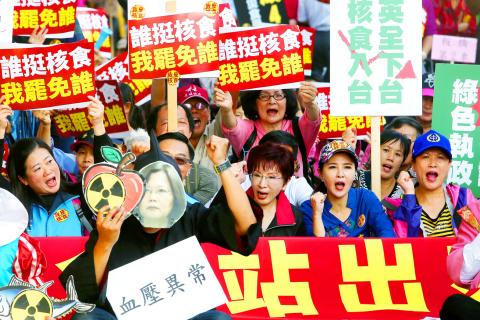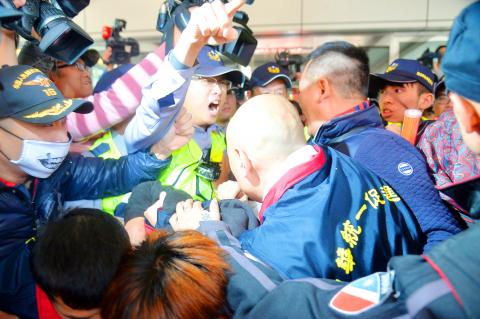The Chinese Nationalist Party (KMT) yesterday took to the streets of Taipei, threatening to recall any lawmakers who voice support for the lifting of the nation’s import ban on Japanese food products from five Japanese prefectures, urging President Tsai Ing-wen’s (蔡英文) administration to provide the public with an explanation.
Taiwan imposed import restrictions on food products from Fukushima, Ibaraki, Tochigi, Gunma and Chiba prefectures following the meltdown at the Fukushima Dai-ichi nuclear power plant on March 11, 2011.
Addressing a rally against the relaxation of the ban outside the Chiang Kai-shek Memorial Hall MRT Station in the afternoon, KMT Chairwoman Hung Hsiu-chu (洪秀柱) accused Tsai’s administration of caving in to Japanese pressure and “forcing radiation-contaminated foods down the throats of Taiwanese.”

Photo: CNA
“We do not understand the Democratic Progressive Party’s [DPP] sudden flip-flop; we do not understand why the government is forcing people and their children to consume radiation-tainted food; and we do not understand … why we have to import radiation-contaminated food products just because of pressure from Japan,” Hung said.
Despite opposition to nuclear power plants being one of its major policy platforms, the DPP on one hand says all of Taiwan proper could be affected in the event of a nuclear disaster, but on the other says that the import of Japanese foods, except those from Fukushima, should be allowed, Hung said.
Hung then led the protesters in chanting slogans such as: “Whoever supports radiation-tainted foods will be recalled” and “opposing radiation-affected foods to save our kids; opposing radiation-affected foods to save ourselves; opposing radiation-affected foods to save Taiwan.”

Photo: CNA
The protesters then marched to Ketagalan Boulevard in front of the Presidential Office Building, before heading toward the Ministry of Finance, which is next to Tsai’s official residence.
The demonstration took place concurrently with a referendum signature collection event held just a few hundred meters away organized by KMT Vice Chairman Hau Lung-bin (郝龍斌), who is reportedly interested in running against Hung in the KMT’s next chairperson election in May next year.
Asked whether the two separate events suggested disagreement between her and Hau, Hung dismissed the idea, saying that KMT headquarters welcomed the referendum drive initiated by Hau on the import ban.
Earlier yesterday, Hau and other KMT officials mobilized hundreds of supporters to boycott the first extra public hearings an lifting the import ban held by the Executive Yuan in New Taipei City’s Sindian District (新店) in the morning.
“The purpose of a public hearing should be to solicit the opinions of all sectors of society before deciding whether to allow imports of Japanese foods from radiation-affected areas,” Hau said. “If the public hearing is merely used by the government to brief or convince the public, we will definitely not accept it.”
The Executive Yuan arranged three extra public hearings on the import ban — scheduled for yesterday, Monday next week and Jan. 8 — after the previous 10 hearings that took place last month were criticized as being held in a hasty manner.
However, the hearing yesterday was disrupted by scuffles and verbal clashes.

A strong continental cold air mass is to bring pollutants to Taiwan from tomorrow, the Ministry of Environment said today, as it issued an “orange” air quality alert for most of the country. All of Taiwan except for Hualien and Taitung counties is to be under an “orange” air quality alert tomorrow, indicating air quality that is unhealthy for sensitive groups. In China, areas from Shandong to Shanghai have been enveloped in haze since Saturday, the ministry said in a news release. Yesterday, hourly concentrations of PM2.5 in these areas ranged from 65 to 160 micrograms per cubic meter (mg/m³), and pollutants were

Taiwan’s armed forces have established response protocols for a wide range of sudden contingencies, including the “Wan Chun Plan” to protect the head of state, the Ministry of Defense (MND) said today. After US President Donald Trump on Saturday launched a series of airstrikes in Venezuela and kidnapped Venezuelan President Nicolas Maduro, concerns have been raised as to whether China would launch a similar “decapitation strike” on Taiwan. The armed forces regularly coordinate with relevant agencies and practice drills to ensure preparedness for a wide range of scenarios, Vice Minister of National Defense Hsu Szu-chien (徐斯儉) told reporters before a

EVA Airways on Saturday said that it had suspended a pilot and opened an investigation after he allegedly lost his temper and punched the first officer several times as their plane was taxiing before takeoff at Los Angeles International Airport. According to a report published on Thursday by The Reporter, the incident occurred after the flight’s Malaysian first officer tried to warn the Taiwanese pilot, surnamed Wen (文), that he was taxiing faster than the speed limit of 30 knots (55.6kph). After alerting the pilot several times without response, the first officer manually applied the brakes in accordance with standard operating

NOT AN OPENING: Trump’s violation of international law does not affect China’s consideration in attacking Taiwan; Beijing lacks capability, not precedent, an official said Taiwanese officials see the US’ capture of the president of Venezuela as a powerful deterrent to Beijing’s aggression and a timely reminder of the US’ ability to defeat militaries equipped with Chinese-made weapons. The strikes that toppled Venezuelan President Nicolas Maduro signaled to authoritarian leaders, including Chinese President Xi Jinping (習近平), US President Donald Trump’s willingness to use military might for international affairs core to US interests, one senior official in Taipei’s security circle said. That reassured Taiwan, the person said. Taipei has also dismissed the idea that Trump’s apparent violation of international law could embolden Beijing, said the official, who was not